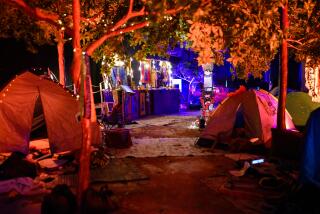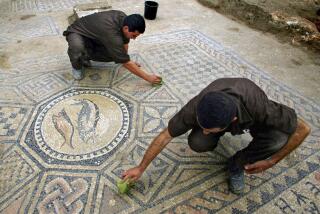Holy Land Exhibit to Get Extra Security
- Share via
Concerned with safety after the Sept. 11 terrorist attacks, the Bowers Museum of Cultural Arts is taking what for it are unprecedented measures to protect the upcoming exhibit of ancient artifacts from Israel, including a religious treasure that has never left that country before.
After conferring with the FBI, local law enforcement and Israeli officials, the Santa Ana museum has ordered metal detectors and armed guards to be in place and has asked for an increased police presence. The “Holy Land” exhibit opens Saturday.
At stake is the protection of two of Israel’s most important links to its ancient history--the so-called House of David inscription and two fragments from the Dead Sea Scrolls.
“It’s shocking to me that the Israel Museum allowed it to go on loan,” said Bill Schniedewind, chairman of the department of Near Eastern languages and cultures at UCLA. “And it’s absolutely fabulous.”
Even before the attacks, museum officials had decided to take special protective measures. As planned early on, an armed escort accompanied the artifacts last weekend from Los Angeles International Airport to the museum.
“What we are doing now is standard for federal buildings,” said museum President Peter Keller in a statement. “And we are really upgrading our security, admittedly as a result of the Sept. 11 events.”
Museum officials said they anticipate record crowds during the show’s three-month run, when the House of David inscription--a stone fragment containing the first mention of King David outside the Hebrew Scriptures--can be viewed for the first time outside of Israel.
Museum spokeswoman Susan M. Metcalf said that after the attacks officials decided extra caution was needed and opted to install metal detectors at the entrance and to post an armed guard at the front door.
She said that even before Sept. 11, the museum had talked to local police about beefing up patrols in the neighborhood during the exhibit.
Other museums, such as the Smithsonian Institution, have similar security measures already in place, Metcalf said. She added that Bowers officials have yet to decide whether to continue the security measures after the exhibit closes Jan. 9.
Officials in the Israeli Antiquities Authority, who traveled with the artifacts, said they debated whether to send replicas after the terrorist attacks, but decided against it.
“We’d prefer to send the replicas, but we promised the museum the items, and they promised us that the security arrangements were in place,” said Tatyana Bitler, a Dead Sea Scrolls conservator. “There will be many people who will enjoy [the exhibit]. It’s very important that people can see these special artifacts.”
The House of David inscription, a basalt chunk of a demolished war monument dating to the 9th century BC, was discovered east of Galilee in 1993. Thirteen lines in Aramaic contain the six-letter phrase “House of David,” giving Jews and Christians independent evidence that the biblical King David was a historical figure.
“This offers an independent witness that characters mentioned in biblical texts lived and breathed and fought with each other,” said Marilyn Lundberg, associate director of the West Semitic Research Project at USC.
In addition, portions of the Dead Sea Scrolls will be displayed in California for the first time in more than 30 years.
The first of the scrolls were discovered in 1947 in a cave near the Dead Sea by shepherds reportedly looking for a lost goat. The writings contain the oldest known copies of the Hebrew Scriptures and other writings, dating from the period of 200 BC to AD 50. In all, about 80,000 writings in Hebrew, Aramaic and Greek were found. The scrolls were one of the 20th century’s major archeological discoveries.
The exhibit also features 50 lithographs by mid-19th century Scottish artist David Roberts and numerous other artifacts spanning 15,000 years of history in the Middle East. Tickets for the exhibit, which will return to Israel immediately after it closes, must be purchased in advance.
Officials said they have plans in place to extend museum hours and open on Mondays if crowds warrant it.
More to Read
Sign up for Essential California
The most important California stories and recommendations in your inbox every morning.
You may occasionally receive promotional content from the Los Angeles Times.














